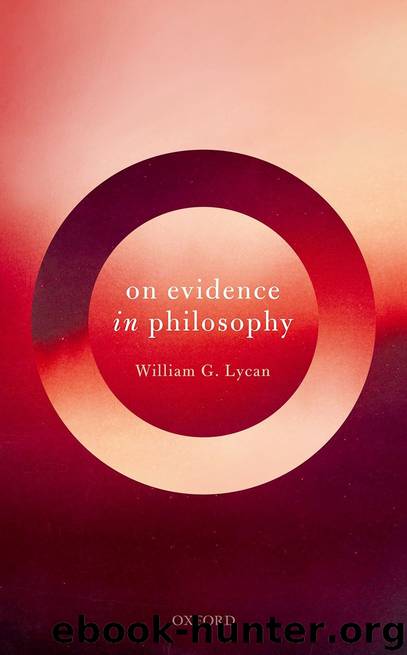On Evidence in Philosophy by Lycan William G.;

Author:Lycan, William G.;
Language: eng
Format: epub
Publisher: Oxford University Press USA - OSO
Published: 2018-12-23T16:00:00+00:00
Objections (2)–(4)
(2) Excrescencehood: In complaining that Cartesian egos are ill-behaved entities that fail to earn their keep, the materialist here lodges firmly in the third-person perspective and assumes a very strong form of the “Theory” theory, that the sole job of mental ascription is to explain facts about the physical world. But, as before, the dualist cannot be expected to grant any such assumption in the first place. Cartesian minds are not explanatory posits at all, much less posited to explain physical facts. They are known from the inside, and there is nothing queer or obscure about that. (And arguments are given for the view that they are Cartesian rather than physical.) Nor is the strong “Theory” theory tenable: as Kathleen Wilkes (1993) has argued, mental ascriptions have all sorts of uses other than explanatory ones.
(3) Laws of physics: Here I am not qualified to adjudicate. But it has been argued by E. Averill and B. Keating (1981) that the conservation laws regarding linear momentum and matter-energy come in weak versions and stronger versions.31 The weak versions are what actually figure in physics. But they are logically compatible with Cartesian causation. The stronger versions have been adumbrated by some philosophers, but are not required for physics and also would beg the question against the dualist.32
(4) Evolutionary theory: At least as stated, the objection is that natural selection could not have produced Cartesian egos because they could not be adaptive. But that assumes an extreme Panglossianism: that a trait or entity could not emerge in the course of evolution by natural selection unless it, itself, were adaptive. No evolutionary biologist believes that. Many un- or maladaptive traits are concomitants or byproducts of other traits that were adaptive.
More to the point, why could the egos not be adaptive, given that they causally interact with the physical? (We have already addressed the Interaction problem, and are entitled to assume on the dualist’s behalf that minds and bodies interact.) The objector may appeal to the causal completeness of physics, even granting the possibility of overdetermination noted in our discussion of Papineau’s argument: it is never solely because of a Cartesian ego that a creature did well in the struggle for resources and safety, and indeed the creature’s physical characteristics would have taken care of that on their own. But on the overdetermination view, it was not, in fact, solely because of the physical characteristics either.
Unlike mine, Churchland’s version of the evolution objection does not specifically appeal to adaptiveness. What he says is, rather:
For purposes of our discussion, the important point about the standard evolutionary story is that the human species and all of its features are the wholly physical outcome of a purely physical process…. We are notable in that our nervous system is more complex and powerful than those of our fellow creatures. Our inner nature differs from that of simpler creatures in degree, but not in kind.
(p. 21)
Which simply and blatantly begs the question.
Since question-begging is such an elementary and easily identifiable fallacy, why do we seasoned professionals commit it as often as we do? (I am no exception.
Download
This site does not store any files on its server. We only index and link to content provided by other sites. Please contact the content providers to delete copyright contents if any and email us, we'll remove relevant links or contents immediately.
Rewire Your Anxious Brain by Catherine M. Pittman(18232)
Talking to Strangers by Malcolm Gladwell(12835)
The Art of Thinking Clearly by Rolf Dobelli(9853)
Mindhunter: Inside the FBI's Elite Serial Crime Unit by John E. Douglas & Mark Olshaker(8672)
Becoming Supernatural by Dr. Joe Dispenza(7811)
Change Your Questions, Change Your Life by Marilee Adams(7344)
The Road Less Traveled by M. Scott Peck(7258)
Nudge - Improving Decisions about Health, Wealth, and Happiness by Thaler Sunstein(7216)
The Lost Art of Listening by Michael P. Nichols(7141)
Mastermind: How to Think Like Sherlock Holmes by Maria Konnikova(6913)
Enlightenment Now: The Case for Reason, Science, Humanism, and Progress by Steven Pinker(6857)
Win Bigly by Scott Adams(6804)
The Way of Zen by Alan W. Watts(6271)
Daring Greatly by Brene Brown(6211)
Big Magic: Creative Living Beyond Fear by Elizabeth Gilbert(5325)
Grit by Angela Duckworth(5278)
Men In Love by Nancy Friday(4948)
Ego Is the Enemy by Ryan Holiday(4922)
Altered Sensations by David Pantalony(4849)
